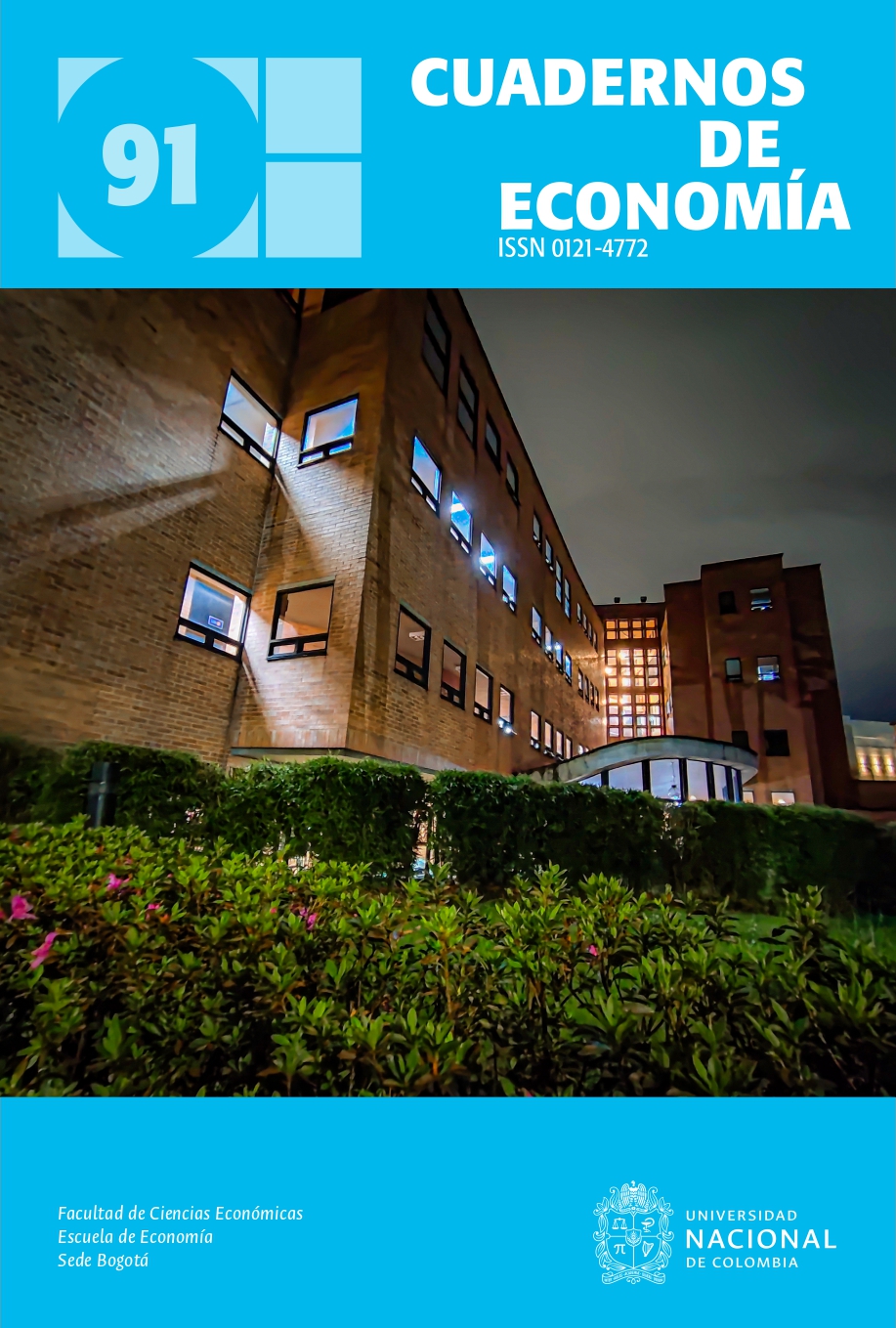Formality and informality in an emerging economy: the case of Colombia
Formalidad e informalidad en una economía emergente: el caso de Colombia
DOI:
https://doi.org/10.15446/cuad.econ.v43n91.94197Palabras clave:
informal economy, public expenditure, exogenous shock, DSGE (en)economía informal, gasto público, choque exógeno, DSGE (es)
Descargas
The objective of this paper is to evaluate the impact of fiscal instruments for Colombia on two of the country’s main issues: income inequality and informality, phenomena that have been exacerbated by the pandemic. For this purpose, we built a DSGE model whose main differentiating element is the level of liquidity of households. The model carried out various simulations of transfers to households, and we examined the effects of these on different macroeconomic variables. We conclude that for the economy to return to the same fiscal adjustment it had before a transfer, the government will somehow have to increase the productivity of the formal sector, as this increase will have a positive effect on growth, increase income taxes and employment, and decrease informality.
El aporte de este artículo es evaluar el impacto de los instrumentos fiscales para Colombia, con base en la desigualdad de ingresos y el grado de informalidad, hechos que se han visto agudizados por la pandemia. Para ello se construye un modelo DSGE, cuyo principal elemento diferenciador son las diferencias entre hogares, medidas por medio de restricciones de liquidez. Se realizan diferentes simulaciones de las transferencias a los hogares y sus efectos sobre distintas variables macroeconómicas. Concluimos que para recuperar la senda de ajuste fiscal que tenía la economía antes de la contingencia, se debe lograr un aumento de la productividad del sector formal, siendo la forma de generar efectos positivos sobre el crecimiento, el aumento de los impuestos a la renta, el empleo y el menor grado de informalidad.
Referencias
Atesagaoglu, O. E., Bayram, D., & Elgin, C. (2017). Informality and structural transformation. Central Bank Review, 17(4), 117-126. https://doi.org/10.1016/j.cbrev.2017.11.002
Departamento Administrativo Nacional de Estadística (DANE). (2022). Estadísticas Nacionales. https://doi.org/10.1920/wp.ifs.2021.221
Dix-Carneiro, R., Goldberg, P. K., Meghir, C., & Ulyssea, G. (2021). Trade and informality in the presence of labor market frictions and regulations (IZA DP No. 14060). Institute of Labor Economics. DOI: https://doi.org/10.17848/wp21-347
Fernández, C., Lilenstein, K., Oosthuizen, M., & Villar, L. (2016). Rethinking the effect of informality on inclusive growth: Lessons from Colombia and South Africa (DPRU Policy Brief 17/47). DPRU and Fedesarrollo.
Fernández, C., & Villar, L. (2016). A taxonomy of Colombia’s informal labor market (Working Paper 73). Fedesarollo. https://doi.org/10.32468/be.676
Hamann, L., & Mejía, F. (2012). Formalizando la informalidad empresarial en Colombia. In L. E. Arango & F. A. Hamann, El mercado de trabajo en Colombia: hechos, tendencias e instituciones (pp. 399-427). Banco de la República de Colombia. https://doi.org/10.1353/eca.0.0016
Levine, P., Vasco, G. J., Pearlman, J., & Yang, B. (2012). An estimated DSGE model of the Indian economy. The Oxford Handbook of the Indian Economy (pp. 835r890). Oxford University Press, New York. DOI: https://doi.org/10.1093/oxfordhb/9780199734580.013.0029
La Porta, R., & Shleifer, A. (2008). The unofficial economy and economic development. In D. W. Elmendorf, N. G. Mankiw & L. H. Summers (Eds.), Brookings Papers on Economic Activity 2008 (pp. 275-352). John Hopkins University. https://doi.org/10.1257/jep.28.3.109
La Porta, R., & Shleifer, A. (2014). Informality and development. Journal of Economic Perspectives, 28(3), 109-126. https://doi.org/10.1353/Jda.2020.0023
Nandi, A. (2020). Indian fiscal policy: A DSGE primer. The Journal of Developing Areas, 54(2), 179-200. DOI: https://doi.org/10.1353/jda.2020.0023
ILO. (1974). Employment, incomes and equality: A strategy for increasing productive employment in Kenya. International Labour Office. https://doi.org/10.1016/j.espe.2016.03.005
Osorio-Copete, L. M. (2016). Reforma tributaria e informalidad laboral en Colombia: un análisis de equilibrio general dinámico y estocástico. Ensayos sobre Política Económica, 34(80), 126-145. DOI: https://doi.org/10.1016/j.espe.2016.03.005
Perry, G. (2007). Informality: Exit and exclusion. World Bank Publications. https://doi.org/10.1596/978-0-8213-7092-6
Ulyssea, G. (2018). Firms, informality, and development: Theory and evidence from Brazil. American Economic Review, 108(8), 2015-2047. https://doi.org/10.1257/aer.20141745
World Bank. (2016). World development indicators 2016. The World Bank. https://doi.org/10.1596/978-1-4648-0683-4
Cómo citar
APA
ACM
ACS
ABNT
Chicago
Harvard
IEEE
MLA
Turabian
Vancouver
Descargar cita
CrossRef Cited-by
1. Nelson Mauricio Murillo Ramirez, Leonardo Antonio Tangarife Mejía, Fernán Fortich Pacheco. (2025). REVISIÓN DE LITERATURA SOBRE EVASIÓN Y ELUSIÓN FISCAL DE PERSONAS NATURALES EN COLOMBIA. Semestre Económico, 28(65), p.1. https://doi.org/10.22395/seec.v28n65a4978.
2. Vicente René Encalada Encarnación, Mayra Paola Mizhquero Jaramillo. (2025). Diplomacia científica aplicada a la economía. Suma de Negocios, 16(34), p.32. https://doi.org/10.14349/sumneg/2025.V16.N34.A4.
Dimensions
PlumX
Visitas a la página del resumen del artículo
Descargas
Licencia
Derechos de autor 2024 Cuadernos de Economía

Esta obra está bajo una licencia internacional Creative Commons Atribución-NoComercial-SinDerivadas 4.0.
Cuadernos de Economía a través de la División de Bibliotecas de la Universidad Nacional de Colombia promueve y garantiza el acceso abierto de todos sus contenidos. Los artículos publicados por la revista se encuentran disponibles globalmente con acceso abierto y licenciados bajo los términos de Creative Commons Atribución-No_Comercial-Sin_Derivadas 4.0 Internacional (CC BY-NC-ND 4.0), lo que implica lo siguiente:




















